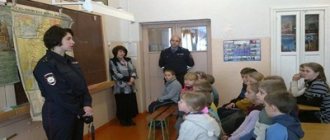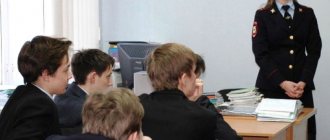Tasks
In-school accounting is aimed at:
- Prevention of neglect, crime, negative behavior of students.
- Detection and elimination of causes, factors, conditions contributing to the commission of offenses and neglect.
- Social and pedagogical rehabilitation of children in a socially dangerous situation.
- Protection of the rights and interests of minors.
- Timely identification of families and children in difficult life situations.
- Providing socio-psychological and pedagogical assistance to minors with behavioral deviations and learning problems.
Why are they put on internal school registration?
The reasons may be as follows:
- Violation of the provisions of the Charter of the educational institution.
- Systematic failure to complete homework.
- Constant lack of textbooks and notebooks.
- Refusal to work in class.
- Talking, shouting, laughing during classes.
- Systematic absence of a child from tests.
- Skipping classes.
- Rudeness towards classmates and teachers, foul language, fights, including those leading to serious bodily harm.
- Smoking and drinking alcohol.
- Committing an offense as a result of which the minor was taken to the police station.
- Committing a criminal act or intentional complicity in it.
- Bullying of children of a different nationality, skin color, religion, etc., of younger or weaker children.
- Violations of order in an educational institution that endanger the health and lives of others.
- Committing an administrative offense.
What threatens
Anyone who comes under the attention of the PDN is subject to constant supervision. Teenagers are carefully checked in case of any incident that occurs in the area or school. Also, PDN employees report all the information to the military registration and enlistment office, which threatens in the future the teenager’s inability to get the desired job, etc.
At first glance, it may seem that there is nothing wrong with the fact that the teenager was registered. However, this is not the case; in any case, it is important to try to avoid being blacklisted. This interferes with the moment of admission to a university, since many educational institutions request a certificate from the police, which will necessarily reflect information that the teenager was registered.
It is also important to remember that a teenager has an unstable psyche and, under the influence of prevention, may commit some stupidity or crime, which can also aggravate the teenager’s situation.
General organizational issues
Decisions on registering children within schools are made at meetings of the Council for the Prevention of Crime and Neglect among Students. The composition and powers of this body are approved by the director of the educational institution.
To register or remove a student from the internal school register, a joint application by interested parties is required. They are the deputy director for educational work, the social teacher and the class teacher.
The procedure is set forth in the Regulations on the registration of students within the school and is approved by the director of the educational institution.
Your psychologist. The work of a psychologist at school.
1. General ProvisionsIn accordance with the Federal Law “On the Fundamentals of the System for the Prevention of Neglect and Juvenile Delinquency,” educational institutions, within their competence, participate in the implementation of a set of measures to prevent antisocial behavior in children and adolescents. 2. Goals and objectives
In order to create objective conditions for improving the quality of preventive work, strengthening the social and legal protection of students, an educational institution is developing a regulation on registering students with internal school registration.
- Grounds for registering students internally
Based on Articles 5,6,14 of the Federal Law “On the Fundamentals of the System for the Prevention of Neglect and Juvenile Delinquency,” the following are considered the grounds for in-school registration: 3.1. Non-attendance or systematic absences from classes without good reason. 3.2. Underachievement. 3.3. Socially dangerous situation: a) neglect or homelessness; b) vagrancy or begging. 3.4. Use of psychoactive and toxic substances, alcoholic beverages, smoking. 3.5. Committing an offense resulting in administrative measures. 3.6. Committing an offense before reaching age. from which criminal liability arises. 3.7. Registration with the KDN, IDN. 4. Grounds for removal from school registration 4.1. Positive changes in the student’s life circumstances specified in this provision (section 3, paragraph 3.1; 3.2; 3.3; 3.4; 3.5; 3.6; 3.7)
5. Responsibility and control over the specified type of activity
5.1. Registration of a student within a school, deregistration of a student, and preparation of the relevant documentation is carried out by the person personally responsible for organizing preventive work in the educational institution, appointed by order of the director. 5.2. Control over the quality of use of the work carried out in accordance with this provision is assigned to the director of the educational institution. 5.3. This provision comes into force from the moment of approval by the school’s pedagogical council.
Algorithm of actions in relation to students who miss classes for an unexcused reason
Direction of activity
| Responsible person | |
| 1.Collect information about students absent from school. Recording in the school notebook. | Subject teachers (after 1st lesson) |
| 2. Determining the reason for the child’s absence from classes: - conversation with classmates; — coordination with parents, family visits | Classroom teacher |
| 3. Individual work with the child to identify problems in the organization of his life activities: - conversation; — testing; — classification of problems; — recommendations: — to the class teacher, — to the child himself, — to parents | School psychologist |
| 4. Organization of activities to resolve the child’s problems: - establishing a trusting relationship with parents. Coordination in activities (familiarization with the School Charter, conclusion of an Agreement between parents and the educational institution (conditions of education, rights, responsibilities, etc.; - individual work with students (involvement in extracurricular activities, the system of additional education); - registration with the school, joint activities with public organizations (parental committee, school council, prevention council, KDN, etc.) | Deputy VR directors, additional education teachers Social teacher, class teacher |
| 5. Tracking work results: - maintaining documentation (lists, individual cards, family social passport; school notebook, etc.); — development of local acts (Rules of student conduct, etc.) — report of responsible persons on the work done and the results obtained | According to functional responsibilities: - class. supervisor; — Deputy Director for VR; - social teacher |
| 6. System of material and moral incentives for the activities of teaching staff | Director of Educational Institution, Municipal Educational Institution |
| 7. Study, generalization, broadcast of effective experience in educational and preventive work | Deputy Director for VR |
| 8. Adjustment of activities based on diagnostic results | Administration of the educational institution |
POSITION
on the Council for the Prevention of Crime and Substance Abuse by Minors in the Educational Environment.
1. The Council for the Prevention of Crime and Substance Abuse by Minors in the Educational Environment (Council of Prevention) is an advisory and organizational body created at an educational institution. The prevention council is approved by the director of the educational institution. The Prevention Council was created to carry out primary prevention of crime and substance abuse among minors in an educational environment, as well as to provide assistance in emergency situations. The Prevention Council carries out comprehensive work with the student’s family where similar problems exist.
2. The purpose of the Prevention Council: prevention / prevention of crime and substance abuse among minors in the educational environment.
3. The main objectives of the Prevention Council are: - expansion of the legal, medical, social, psychological and pedagogical knowledge base among parents and students; — providing methodological and advisory assistance to teachers, and, if necessary, to parents and students; — organization of events aimed at preventing crime and substance abuse among minors; — organization of leisure and additional education for students; — compiling a “risk group” database and working with it.
4. The Prevention Council includes the following specialists: - director of the educational institution; - deputy director for educational work (if the position is not provided for in the staffing table - deputy director for educational work); - teachers (the most experienced, authoritative and active teachers - no more than 2-3 people); — educational psychologist; - social teacher; - medical worker; — representative of law enforcement agencies (traffic police inspector, etc.); - parents (active representatives of the school’s parent committee - no more than 2 people); - students (high school students - no more than 2 people). The Prevention Council reports to the director of the educational institution. The Prevention Council communicates with specialists of a narrower specialization (as needed).
5. Functional responsibilities of the specialists of the Prevention Council: director of the educational institution: - exercises full control over the work of the Prevention Council; Deputy Director for Educational Work: - controls the ongoing documentation of the Prevention Council during the academic year; — provides the necessary methodological assistance to teachers - members of the Prevention Council; — organizes events aimed at preventing crime and substance abuse; — controls the implementation of preventive education programs and monitors work on the selected program; — organizes leisure and additional education (club work) for students; — monitors work against the “risk group” database; teachers: - form a pedagogical vision for the problems being discussed; — participate in compiling a database of “at-risk” students; — actively participate in the implementation of preventive training programs; — provide all possible assistance in carrying out activities aimed at preventing crime and substance abuse. educational psychologist: - works to promote psychological and pedagogical knowledge in the field of preventive psychology; — carries out psychological diagnostics before the start of comprehensive assistance to the family, as well as after the work carried out in order to monitor the achieved result; — provides advisory assistance to students and parents; — promotes the harmonization of the social sphere of the institution and carries out preventive measures to prevent the occurrence of social maladjustment; — identifies factors that hinder the development of the personality of “at-risk” students and takes measures to provide various types of psychological assistance (psychocorrectional, rehabilitation and advisory); — advises the administration and teachers of an educational institution on various psychological issues; — provides various forms of preventive work with teachers, parents and students. social teacher: - studies the psychological, medical and pedagogical characteristics of the personality of students at risk and its microenvironment, living conditions; — provides the “risk group” database with new information (if it appears); — identifies the interests and needs, difficulties and problems, conflict situations, deviations in the behavior of students at risk and promptly provides them with social assistance and support; - acts as an intermediary between students at risk and the institution, family, environment, specialists of various social services, departments and administrative bodies;
- monitors the social conditions of the families with whom the Prevention Council works.
medical worker: - expands the medical knowledge base among students and their parents; — conducts planned classes aimed at preventing the abuse of psychoactive substances by children and youth; — provides data on the health status of students at risk. representative of law enforcement agencies: - expands the legal knowledge base among students, parents, and teachers; — actively works with “at-risk” students; — holds meetings and classes with students aimed at crime prevention; — makes joint raids on the families of “at-risk” students with a social teacher.
6. The Prevention Council holds meetings once a month (at least) and in case of an acute emergency situation.
7. Mandatory documents of the Prevention Council are: - annual work plan of the Prevention Council; — part of the annual plan of an educational institution on the topic “Organization and implementation of the prevention of crime and substance abuse by children and youth”; — programs of seminars, trainings, plans of events, preventive classes with schoolchildren, parents and teachers; — minutes of meetings of the Prevention Council; — annual report on the work of the Prevention Council. — minutes of meetings of the Prevention Council; — journal of the results of the work performed; — prepared database of “risk groups”. After working with the family, the educational psychologist conducts a survey of the child and his parents in order to identify the dynamics and results obtained.
8. All documentation on the work of the Prevention Council is kept by the director.
Algorithm of actions of the Deputy Director for Educational Work on organizing the implementation of the Federal Law “On the Fundamentals of the System for the Prevention of Neglect and Juvenile Delinquency” 1. Ensuring the regulatory framework. 2. At the first stage, call the juvenile affairs inspector to find out whether the school students are registered with the PDN, and receive the documents that became the basis for registering the students. 3. Send a social teacher (class teacher) to a meeting of the district (city, regional) commission on juvenile affairs, to trials and receive an extract from the decision regarding the prosecution of adolescents. 4. Monitor and manage the activities of class teachers in organizing preventive work with minors: a) through checking the plans of class teachers, class registers and relevant documentation; b) reports from a social teacher, class teachers about the psychological climate in students’ families, about problems related to education, upbringing, childcare, about the reasons that negatively affect their behavior, academic performance and school attendance, at meetings with the director and at teachers’ councils according to plan and, as necessary, with the invitation of the district inspector, PDN inspector, CDN secretary in order to obtain information about the problematic behavior of children, about dysfunctional situations in families; c) training class teachers in the class teachers’ educational program and individually advising them on the prevention of neglect and juvenile delinquency, d) organizing a thematic exhibition of literature for children, parents, class teachers in the school library, e) applying to other authorities for help and assistance in their work with individual families and students in the event that issues are beyond the competence of the school - drawing up a coordination plan of activities (annually); — creation of a Prevention Council in the educational institution (as necessary) 5. Prepare a draft order on the registration of families and students with school registration, on the organization of individual preventive work with them based on materials provided by the social teacher and the class teacher, and approve the criteria for school registration. 6. Provide practical assistance to the class teacher in involving registered children in extracurricular activities, especially in the summer. (Study of regulatory documents, experience of organizational and pedagogical activities and their use in the practice of preventive work. - Analysis of existing preventive programs and bringing them into compliance with standards.) 7. Find an opportunity to note the effective activities of teachers in organizing preventive work with minors.
Protocol form
Protocol of pedagogical investigation of the reasons for committing an offense (crime) by a minor
- FULL NAME;
Date of Birth; Home address; Class, school;
- Family information:
— whether he is registered (date of registration; where) — the number of children in the family; - who is involved in upbringing (parents or persons replacing them); - complete, incomplete family; - financial situation of the family; — types of material and social assistance provided;
- Educational activities:
- academic performance; — attendance; — pedagogical work done if the student has problems in learning;
4. Mental and physical development: - date of referral and results of the PMPK examination; — providing psychological and pedagogical support; — bad habits (working with specialists); - physically developed, not developed;
5. Extracurricular activities: - identifying interests; — employment in the preschool system (where); — participation in extracurricular activities;
6. Individual preventive work (where and by whom it was carried out) - in-school records; — PDN; — KDN, etc.
7. Probable reasons for registration
8. Recommendations for organizing further educational work with students.
Head teacher.
M.P.
Date of.
Documentation
To register a child for internal school registration, 3 days before the meeting of the Council, the Deputy Director for Educational Work is provided with:
- Characteristics of the student.
- Analysis of work with a child and his parents (representatives). The document is prepared by the class teacher.
- Resolution of the KDN (if any).
- An inspection report on the family’s living conditions (if necessary).
- Application from parents (representatives) to provide them with assistance (if necessary).
How to avoid
In order to avoid registering a teenager, it is necessary that the family be notified in advance before the KDN meeting. Parents need to collect the necessary package of papers:
- Characteristics from school;
- Characteristics of the clubs or sections that the teenager attends;
- Written reviews from neighbors;
Of course, the ideal option is when parents undertake to take control of their child. It is recommended to organize joint leisure time and interest the child in order to avoid negative consequences. After parents write a receipt and take close control of their child, they are required to inform the police.
It is important to remember that the procedure for registering a teenager is serious and it is difficult to avoid it unless the situation is corrected in advance and the maximum conditions are not applied to correct the teenager and prevent a meeting of the Control Committee.
Contents of the meetings
Authorized persons discuss and approve a plan of individual preventive work with a minor, as well as his parents (representatives), set deadlines for implementing the list of activities, and appoint responsible persons.
Parents must be present at the meeting. They are invited by the class teacher. He also brings to the attention of parents the decisions made at the meeting if, for good reasons, they were unable to attend the discussion. Representatives of the minor are sent an official notification indicating the date of the meeting, the protocol number, and the reasons for registration/removal from school registration.
TsVINP
This is the name of the Center for Temporary Isolation of Juvenile Offenders - a closed institution where out-of-control, uncontrollable teenagers, starting from the age of 14, are placed. PDN inspectors have the right to prepare materials for the court for a decision to place a child in such a center (up to 30 days) if they have established the following:
- a teenager, who was put on preventive registration and sent to a specialized closed educational institution, left it without permission;
- the offender is so dangerous that other children may suffer from his actions. Thus, in practice, there is a case where only isolation saved a 4-year-old sister from the brutal beating of her 15-year-old brother;
- A minor who has committed a socially dangerous act has no place of residence, is engaged in vagrancy, has no relatives, etc. It happens that children leave on passing transport to another city, where they are placed in the Central Medical Institution until the issue of being sent home is decided;
- An offender who has reached the age of 14, whose identity cannot be established, was detained.
At-risk groups
There are several categories of minors with whom mandatory preventive work is carried out on an individual basis. These include:
- Homeless and neglected.
- Children involved in begging and vagrancy.
- Minors in social rehabilitation centers, shelters, and other specialized institutions who are left without parental care and in need of help.
- Those who use psychotropic/narcotic substances without a doctor’s prescription, intoxicants, alcohol or alcohol-containing products, beer, and other drinks that contain alcohol.
- Minors who have committed offenses for which they were given administrative punishment.
- Those who have committed a crime but were not convicted due to not reaching the age of criminal responsibility.
- Registered with ODN, KDN.
Concept
One of the structural elements of law enforcement agencies, due to their official duty and responsibilities, work with difficult teenagers. Troubled teenagers are not registered by the decision of one person; all actions of employees are enshrined in the order of the Ministry of Internal Affairs of Russia No. 569-2000. Minors who are registered need constant supervision, they are surrounded by attention, and educational conversations are held with them.
Preventive work with parents of minors
Often, antisocial behavior of adults provokes a negative reaction from children. Statistics show that in most cases, problems at school arise among minors brought up in dysfunctional families. The negative influence of adults can be reduced or completely eliminated through preventive and explanatory conversations. This work is primarily carried out with parents:
- failing to fulfill their responsibilities for the maintenance, training, and education of minors;
- negatively influencing the behavior of their children;
- allowing violence in the family.
Removal from the register
Of course, a minor cannot remain on the school’s register forever: the grounds for registration may well disappear over time.
Deregistration is carried out if:
- There are positive changes in the child’s behavior and the circumstances of his life, which persist for at least 2 months.
- The minor graduated from an educational institution, including early.
- The child changed his place of residence and moved to another school.
A minor may be deregistered for other objective reasons.
To conduct a meeting of the Council, the following documents are required:
- Statement from a social teacher or class teacher.
- Notification of the child's parents (representatives).
- Analytical report on the results of individual work with the student and his family.
At the meeting of the Council, the student’s characteristics on internal school records will be considered and the opinions of teachers will be heard.
Rules and grounds
It is worth noting that in order to get an account card you need to have serious reasons. In the event that the teenager has committed an offense for the first time and is not particularly significant, and there is a positive characteristic of the teenager from school, and the family is prosperous, then there is a possibility that registration can be avoided.
Have a question for a lawyer? Ask now, call and get a free consultation from leading lawyers in your city. We will answer your questions quickly and try to help with your specific case.
Telephone in Moscow and the Moscow region: +7
Phone in St. Petersburg and Leningrad region: +7
Free hotline throughout Russia: 8 (800) 301-39-20
The following rules exist: in the case when the resolution on an administrative offense has gained legal force or the head of the internal affairs department has signed, then in this case the minor will be immediately registered.
To register a minor teenager, it is enough to commit an act that falls under one of the articles of Order 659 of the Ministry of Internal Affairs, Article 34.1.2.
Punishment can be different:
- Administrative penalty;
- Fine;
- Other.
Organization of preventive measures
Individual work must be carried out within the period necessary to provide social and other assistance to the minor, or until the grounds and conditions that contributed to the child’s homelessness, neglect, antisocial behavior or delinquency are eliminated, or until other circumstances arise as provided for by law.
The prevention plan is developed by the class teacher together with an educational psychologist and a social worker. An escort card must be issued for a minor. It is led by a social teacher together with the class teacher. If necessary, other specialists whose responsibilities include working with this group of minors may be involved.
The class teacher is responsible for carrying out individual preventive measures, monitoring the child’s educational and extracurricular activities, and analyzing the effectiveness of the measures taken. The parents of the minor are notified of the results of the work. In the event that absences from lessons, insufficient preparation for classes and other deviations in the behavior of a student become systematic, he and his parents are invited to a meeting of the Council to consider issues about:
- Failure of parents to fulfill their responsibilities for raising and educating a child.
- Avoidance of education by minors.
If necessary, other issues that deserve attention may be considered.
Powers of the Council
The Prevention Council has the right to petition the director of an educational institution for:
- Reprimanding a minor.
- Drawing up an individual plan for additional classes during the quarter or during the holidays.
- Expressing gratitude to a minor.
- Establishing a deadline for submitting debts in academic subjects and monitoring their compliance.
- Postponement of the end date of a quarter or academic year for a student who has been undergoing long-term treatment or in difficult living conditions.
Important point
If, based on the results of preventive measures, the class teacher, social teacher or educational psychologist concludes that it is necessary to provide special assistance to a minor, the administration of the educational institution sends a request to the preventive authorities. If parents refuse the offered help or do not want to deal with the child’s problems, the director of the educational institution has the right to contact the KDN with a request:
- Carry out preventive measures with minors who use narcotic/psychotropic drugs or alcohol, who have committed administrative offenses and have been punished for this, and who have returned from specialized medical or educational closed institutions.
- Review the materials collected regarding the student who committed an administrative violation.
- Provide assistance in organizing additional education or summer recreation for a registered minor.
- Make a decision to expel a child under 15 years of age from an educational institution or transfer him to another school.
- Apply administrative measures against minors who violate the provisions of the Law “On Education”.
- Register the child with the ODN.
The following must be attached to the application:
- Characteristics of the minor.
- Copies of family visitation documents.
- Analytical report on the preventive measures taken.
If there are a lot of materials, it is advisable to combine the characteristics and the certificate into one document.
Consequences of registering with the police
The teenager and parents will be under constant supervision. Conversations will begin with them, a program may be developed that includes certain classes, diagnostics, and testing. In case of any incident on the territory of a school, area or where this teenager was seen, the police have the right to check him for involvement in the act.
Through school and social services, the child can be involved in special extracurricular activities, volunteering, or organized summer vacations or training. Moreover, such events will become “conditionally voluntary.” That is, it is possible to refuse them, but the refusal will be entered on the registration card and will be regarded as an unwillingness to change one’s life and improve. In addition, parents may be required to schedule where and how the child will spend the summer or winter holidays.
NEED TO KNOW. PDN employees are not required to inform the parents of such children about all the actions that they perform in relation to the child. They have the right to visit or call the child even without notifying the parents, have a conversation with him, and offer to participate in some event.
The military registration and enlistment office requests information about registration in the PDN. The consequences may also be unfavorable for those who wish to enroll in some secondary educational institutions and universities, especially those focused on public service (military, border guard, legal and others). Such organizations often request a certificate from the police indicating whether the future student is registered.
Being registered may become a barrier to entry into some universities







